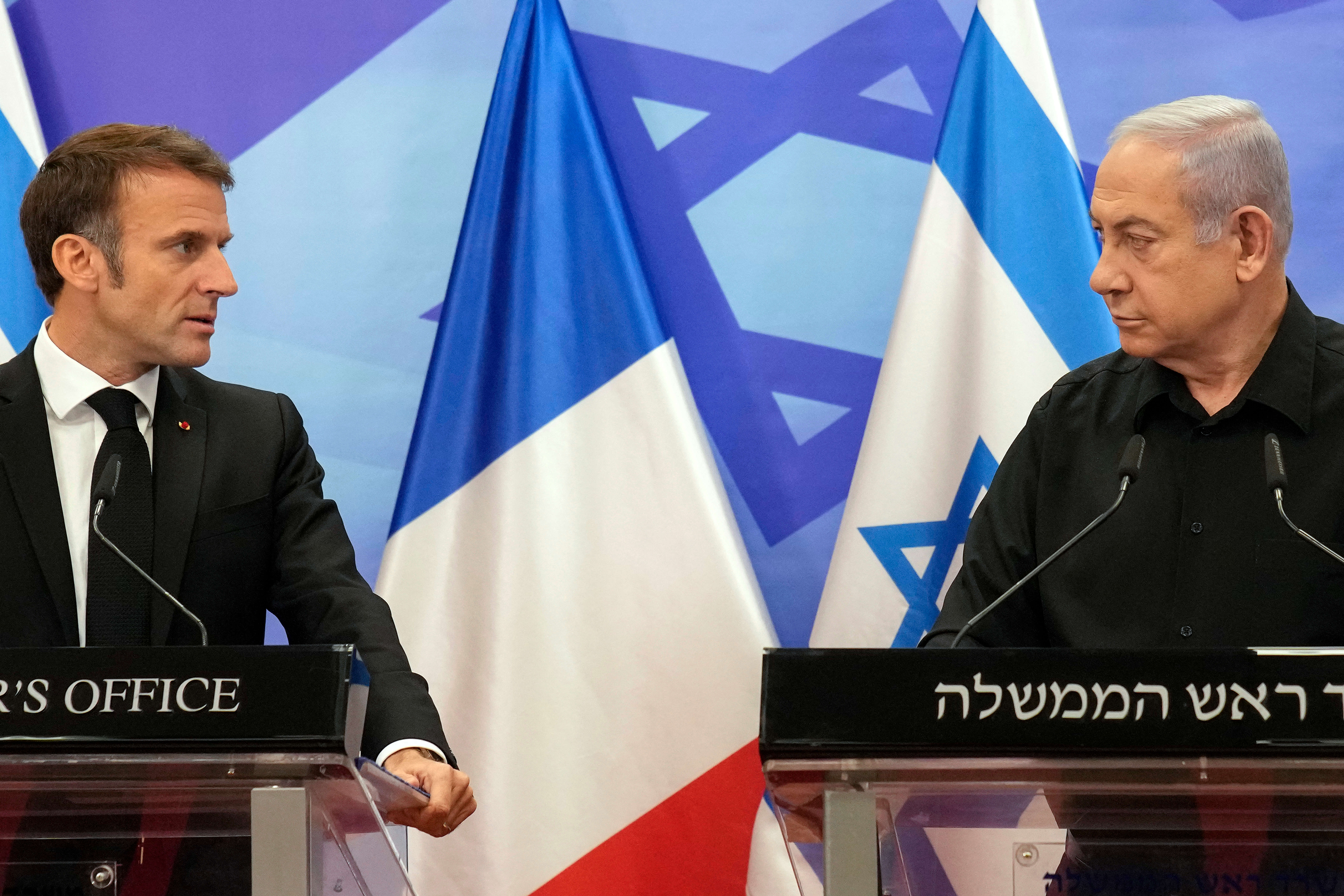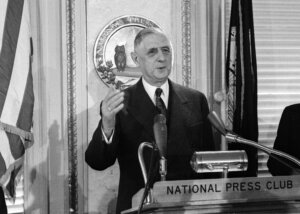De Gaulle would weep at the soullessness of Netanyahu and Trump
Blaming France for the murders in Washington, D.C. is yet another low for Israel’s prime minister

French president Emmanuel Macron and Israeli prime minister Benjamin Netanyahu. Photo by Getty Images
Over the past week, a new front has opened on the war in Gaza. It is not, however, along the banks of the Jordan with Israelis and Hamas pitted against one another, but instead along the banks of the Seine with French and Israeli governments trading salvoes of accusations.
This battle of diplomatic slights and slurs, of course, is a sideshow to the unspeakable tragedy unfolding in Gaza. But it is nevertheless significant, for it casts light on what is politically and morally at stake with the intensifying war being fought not just between Israel and Hamas, but also between Israel and its traditional allies.
Of late, ties have been especially fraught between Israel and France. Yet this méfiance, or mistrust, between the two countries has not always been the case. France was, after all, one of the first nations to officially recognize the state of Israel, it fought alongside Israel and Britain in the misbegotten invasion of the Suez Canal, and it furnished Israel not only with vital military equipment — notably the Mirage fighters — and nuclear technology.
All of this went south when France’s Fourth Republic collapsed during the Algerian crisis and was replaced by the Fifth (and current) Republic, the work of its first president, Charles de Gaulle. At first, de Gaulle praised David Ben-Gurion as “one of the greatest leaders in the West” and proclaimed the justification of a Jewish state as “some compensation for suffering endured through the long ages.”
By 1967, however, de Gaulle had already begun France’s diplomatic and strategic pivot to the Arab states. Dead-set on reviving French greatness on the world stage, de Gaulle grasped the vital place of the Arab world — a world in which France had left an indelible footprint as a colonial power — in a quickly evolving geopolitical landscape. In the lead-up to the war, de Gaulle thus imposed an arms embargo on the region, one that affected only Israel. Moreover, when Israel ignored his warning to foreign minister Abba Eban that Israel must not fire the first shot, the General erupted in anger: “They did not listen to me!”
Relations only worsened when at a news conference later that year, de Gaulle portrayed the Jews as “an elite people, self-assured and domineering.” This description, which de Gaulle not unpersuasively insisted was meant as a compliment, not only shocked Israelis but also French Jewry, including the great French intellectual (and former Gaullist) Raymond Aron. In the subsequent furor, a prescient remark de Gaulle had made went unheard: “Israel is setting up in the territories it has captured an occupation that will inevitably involve oppression, repression and expulsions, and a resistance to this occupation is forming, which Israel in turn classes as terrorism.”
Relations nevertheless improved after the turn of the 21st century under the presidencies of the conservative Nicolas Sarkozy and socialist François Hollande. They both moved diplomatically closer to Israel, a shift powered by the rash of Islamist terrorist attacks in France as well as Israel.

In 2017, with the victory of Emmanuel Macron in the presidential election, Franco-Israeli ties seemed as if they would remain strong. During his campaign, Macron visited the Holocaust Memorial in Paris, intoning “Never again” and thus reaffirming France’s official vow, first made by President Jacques Chirac in 1995, of assuming the nation’s responsibility for its role in the Final Solution. Moreover, he also presided that year over the ceremony of the infamous Vel d’Hiv roundup, reiterating his belief that anti-Zionism and antisemitism are one and the same.
Benjamin Netanyahu, who attended that ceremony, praised Macron’s declaration. Subsequently, though, the two leaders, rather than standing side-by-side, have been instead trying to stand on one another’s necks. Since winning reelection in 2021 in the rerun of his match against the far-right Marine Le Pen, Macron has grown increasingly impatient with the far-right shift of Netanyahu. While Netanyahu pursued, for opportunistic (though effectively nihilistic) reasons, an entente cordiale with the leaders of the radical and expansionist settler movement, Macron became more outspoken on Israel’s oppressive policies in the occupied territories.
Macron immediately denounced the murderous Hamas attack on Israel on Oct. 7, 2023, invoking his nation’s commitment to the politics of “Never again.” Yet as a just war against Hamas turned into an unjust war against Palestinian civilians, Macron began to condemn, with increasing candor, Israel’s actions. In a televised interview he gave two weeks ago, Macron’s criticism leaped an octave.
Denouncing Israel’s strangling of humanitarian assistance to Gaza, he declared that what Netanyahu’s government was doing was “unacceptable.”
“There is no water, no medicine, the wounded cannot get out, the doctors cannot get in. What he is doing is shameful,” he said. At the same time, he confessed his impotence to influence Israel: “I have had tough words with Prime Minister Netanyahu. I got angry, but they [Israel] don’t depend on us, they depend on American weapons.”
Shortly after, Macron spearheaded a declaration made jointly with the Canadian and British prime ministers, Mark Carney and Keir Starmer, condemning Israel’s cut-off of humanitarian aid and food to the population of Gaza, effectively condemning them to starvation. On behalf of their countries, the three leaders decried Israel’s “disproportionate escalation” of military actions in Gaza, the “level of intolerable suffering” imposed on the civilian population by Israel, and its “forced displacement” of an entire population.
Finally, the declaration also rebuked government officials in Israel for the “odious language” used in regard to the men, women, and children who they were bombing and starving to death.
Predictably, the response by Netanyahu was yet even more odious. Following the horrifying murder of two members of the Israeli embassy staff last week in Washington, Netanyahu laid the blame squarely at the feet of these leaders: “I say to President Macron, prime minister Carney and prime minister Starmer, when mass murderers, rapists, baby killers and kidnappers thank you, you’re on the wrong side of justice.”
It was no accident that Macron’s name topped the list of miscreants — a fact made clear when the minister of the Diaspora, Amichai Chikli, claimed that “Emmanuel Macron, Keir Starmer, and Mark Carney” were propagating the blood libel used against Jews, and foreign minister Gideon Saar accused the trio of “inciting violence” against Jews across the world.
Macron’s avowal of powerlessness and acknowledgment that the United States alone can force Netanyahu to join, I guess, “the wrong side of history” has since occurred. Last week, Donald Trump seems to have pushed Netanyahu to slightly ease the blocking of food and medicine. Of course, there is only the barest of reasons to welcome this shift. Not only is the shift in Israel’s utterly inhumane and illegal policy utterly inadequate to meet the desperate needs of two million civilians, but it was the work of an individual no less soulless and shameless than the Israeli leader.
Both men illustrate the observation made by Charles de Gaulle that “patriotism is when love of your own people comes first, and nationalism is when hate for people other than your own comes first.” Were he alive today, the great man would gaze at this spectacle in shame.















